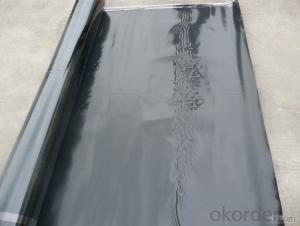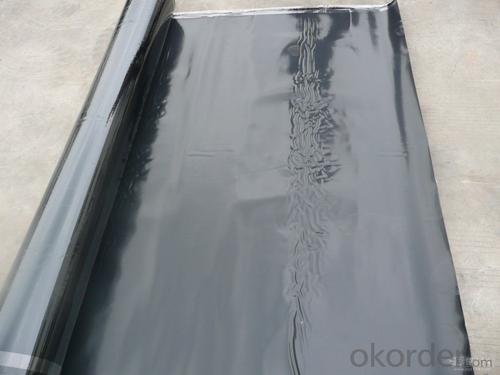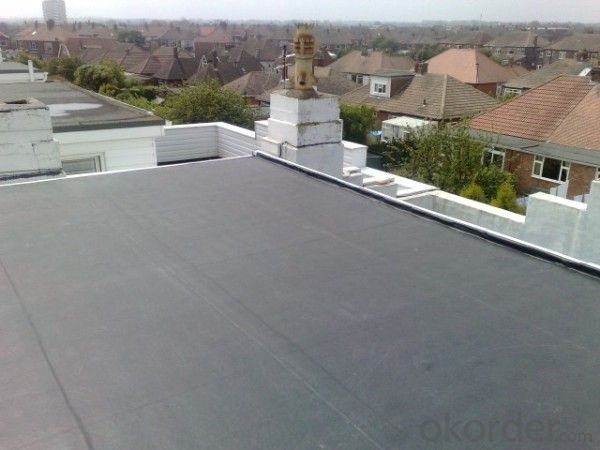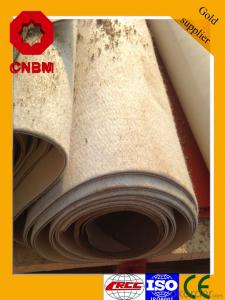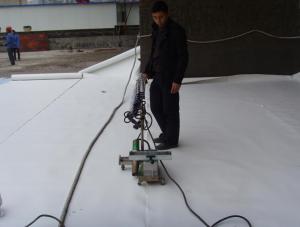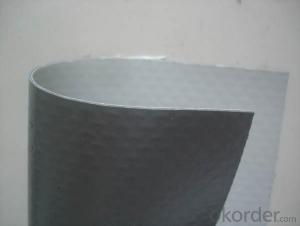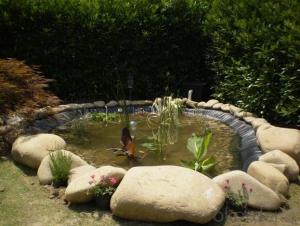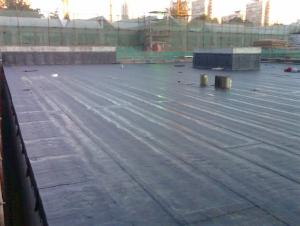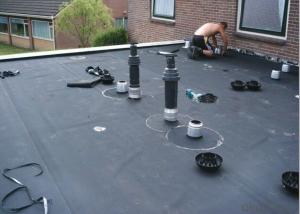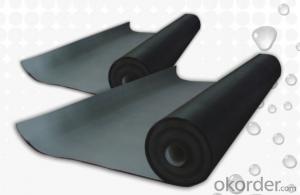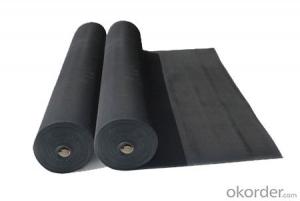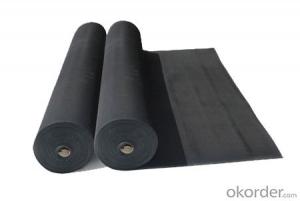EPDM Coiled Waterproof Membrane with High Tensile Strength
- Loading Port:
- Shanghai
- Payment Terms:
- TT OR LC
- Min Order Qty:
- 50000 m²
- Supply Capability:
- 5000000 m²/month
OKorder Service Pledge
OKorder Financial Service
You Might Also Like
EPDM Coiled Waterproof Membrane with High Tensile Strength
Description Of EPDM Coiled Waterproof Membrane with High Tensile Strength:
1. Excellent physical and mechanical performance, high tearing resistance;good deformation adaptability, high puncture resistance;
2. High aging resistance, high UV resistance, anti-acid & alkali;
3. Excellent low & high temperature resistance, innocuous, long life span;
4. Perfect water proof performance, seepage and humidity resistance.
Main Features of EPDM Coiled Waterproof Membrane with High Tensile Strength:
A.Polyester based SBS Modified Bitumen Waterproofing Membrane
a. Strong impermeability
b. High tensile strength, elongation, ability to adapt the grassroots shrinkage deformation and cracking
c. Puncture-resistant, broken resistant, tear-resistant
d. The corrosion resistance, resistance to mildew, weathering good
e. Construction convenient, hot-melt can be operated Four Seasons Construction, reliable joints
B. Fiberglass based SBS Modified Bitumen Waterproofing Membrane
a. High tensile strength, stability of a good size
b. High Temperature good performance
c. Damage resistance, corrosion resistance, resistance to mildew, weathering good performance
d. Good construction performance, reliable joints.
Specifications of EPDM Coiled Waterproof Membrane with High Tensile Strength:
| Material | EPDM Rubber |
| Size | 1.2m (width)*20m (length) or customized, weldable type 2.05m or 4m width |
| Thick | 1.2mm, 1.5mm, 2.0mm |
| Type | Vulcanized & Weldable |
| Pattern | Non-reinforced (homogeneous) |
| Certificate | ISO9001/14001 |
Applications of EPDM Coiled Waterproof Membrane with High Tensile Strength:
geomembrane used in groundsill of road, highway, railway and waterproof layer of swelling clay and wet collapsed loess.Geomembrane can be widely used in areas of garbage burying, waste disposal and underground construction projects.such as below:
- aquaculture ponds
- Ouchi root barrier membrane
- Floating baffles;
- Process wastewater
- Stormwater impoundments;
- Secondary containment;
- Spill containment
- Manure and biogas tanks and covers
- Potable water tanks and covers;
- Sludge Drying beds;
- Bioremediation covers & liners;
- Leachate ponds
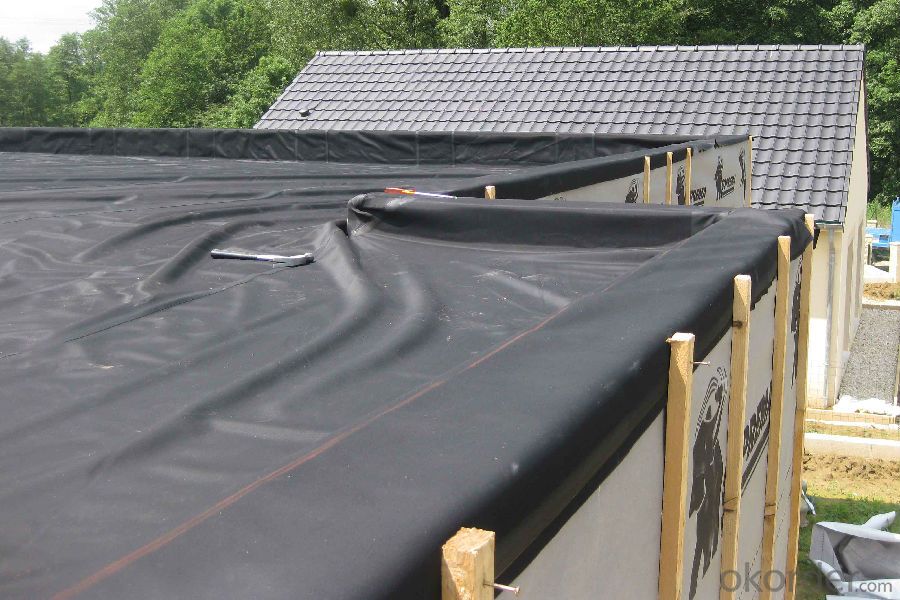
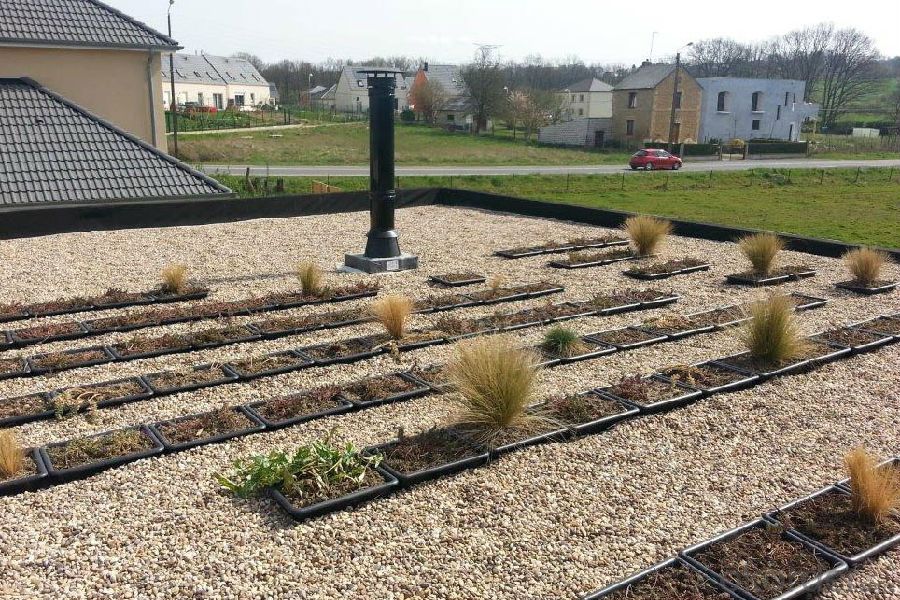
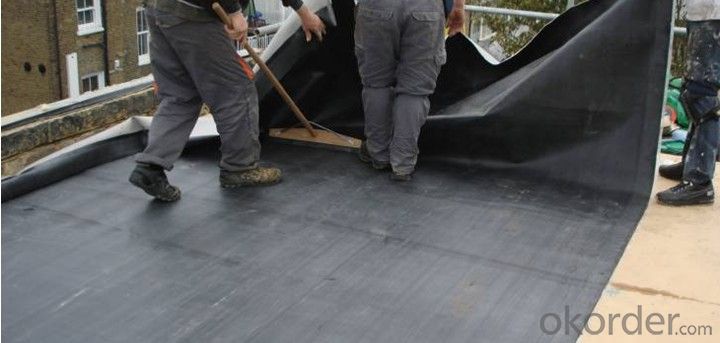
IMages of EPDM Coiled Waterproof Membrane with High Tensile Strength:
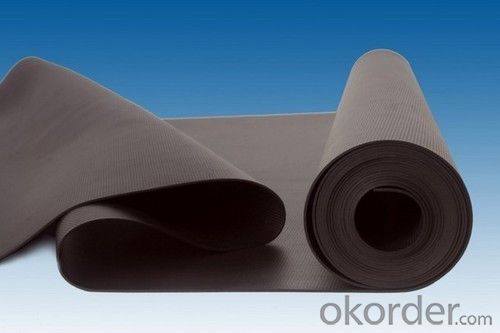
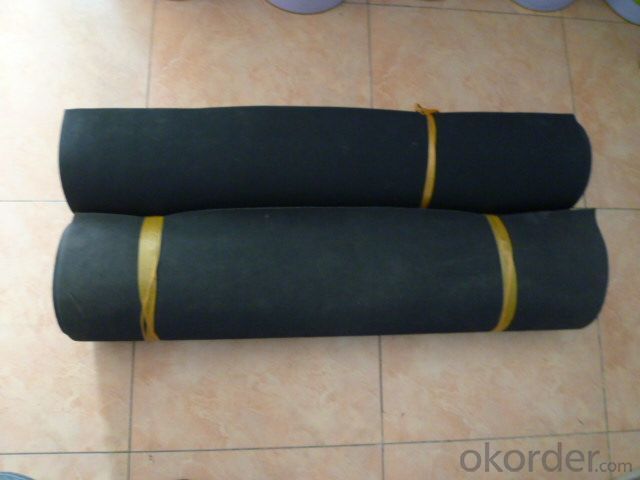
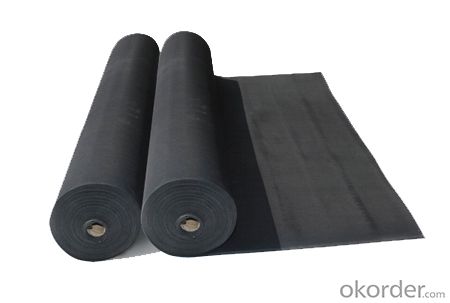
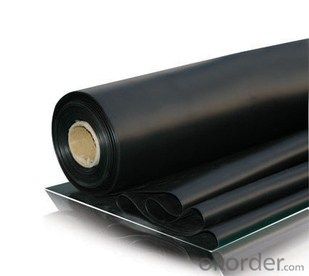
FAQ of EPDM Coiled Waterproof Membrane with High Tensile Strength:
1. What are we supplying?
We are specialized in producing Colorful Asphalt Roof Shingle, SBS/APP modified bitumen waterproof membrane, Self adhesive bitumen waterproof membrane, PVC waterproofing membrane, EPDM rubber roofing membrane, Single Component Polyurethane Waterproof Coating, and Spray Polyurea Waterproof Coating
.
2. How Many years experience do we have?
We have been exported to more than 20 countries in the past 15 years.
3. How long do we usually reply your request?
We always reply our customer within 24 hours.
- Q: Can a waterproofing membrane be applied on a vertical surface?
- Yes, a waterproofing membrane can be applied on a vertical surface. In fact, waterproofing membranes are commonly used on vertical surfaces such as walls, foundations, and retaining walls to prevent water infiltration and protect the underlying structures. These membranes are designed to adhere to vertical surfaces and create a barrier that prevents water from penetrating through. They are typically applied using a variety of techniques including spray or roller application, and can be used in both new construction and renovation projects. The use of a waterproofing membrane on a vertical surface is an effective way to ensure the long-term durability and integrity of the structure by preventing water damage.
- Q: Can a waterproofing membrane be used on metal block surfaces?
- Yes, a waterproofing membrane can be used on metal block surfaces. Waterproofing membranes are designed to create a barrier against water and moisture, and they can be applied to a variety of surfaces, including metal. The membrane will adhere to the metal surface, creating a waterproof layer that helps prevent water infiltration and protect the metal from rusting or corrosion. However, it is important to ensure that the metal surface is clean, dry, and properly prepared before applying the waterproofing membrane to ensure proper adhesion and effectiveness. Additionally, it is recommended to consult with a professional or refer to the manufacturer's instructions for specific guidance on using a waterproofing membrane on metal block surfaces.
- Q: Can a waterproofing membrane prevent mold and mildew growth?
- Yes, a waterproofing membrane can help prevent mold and mildew growth. Mold and mildew thrive in damp and moist environments, and waterproofing membranes create a barrier that prevents water from seeping into the underlying surfaces. By keeping the area dry, the membrane reduces the conditions necessary for mold and mildew to grow. Additionally, some waterproofing membranes are designed with antimicrobial properties, which further inhibit the growth of mold and mildew. However, it is important to note that while a waterproofing membrane can help prevent mold and mildew growth, it is not a foolproof solution. Proper ventilation and maintenance are also crucial in preventing these issues.
- Q: Can a waterproofing membrane be installed on any surface?
- No, a waterproofing membrane cannot be installed on any surface. It requires a suitable and prepared surface that is clean, dry, and structurally sound for proper installation and effectiveness.
- Q: Are waterproofing membranes suitable for historical preservation projects?
- Depending on the specific circumstances and goals of a historical preservation project, the use of waterproofing membranes may be suitable. Waterproofing membranes are designed to prevent water infiltration and protect historical structures from moisture damage. In certain situations, historical buildings may have deteriorated or ineffective existing waterproofing systems. In these cases, modern waterproofing membranes can be a viable option to preserve and safeguard the structure. These membranes can be discreetly installed without altering the building's original appearance or architectural integrity. However, it is crucial to exercise caution when considering the use of waterproofing membranes in historical preservation projects. The potential impact on the authenticity and historical value of the structure must be carefully assessed. Some historical buildings may require specialized preservation techniques due to unique construction methods or materials, making alternative preservation methods more appropriate than using membranes. Furthermore, the long-term consequences and maintenance requirements of waterproofing membranes should be taken into account. Certain membranes may have a limited lifespan, necessitating periodic inspections and maintenance to ensure their continued effectiveness. This ongoing maintenance should be included in the preservation plan and budget. Ultimately, the decision to incorporate waterproofing membranes into historical preservation projects should be based on a thorough evaluation of the building's specific needs, characteristics, and preservation objectives. Consulting preservation experts, architects, and engineers can help determine the most suitable approach for each unique project.
- Q: What is the warranty or guarantee for a waterproofing membrane?
- Different manufacturers and products have varying warranties or guarantees for waterproofing membranes. Typically, a warranty is expected for a waterproofing membrane to ensure its performance and durability. This warranty covers defects in materials or workmanship and guarantees that the membrane will remain waterproof for a specific period. The warranty length can vary based on the quality and type of the membrane, ranging from a few years to several decades. Some manufacturers offer a limited warranty, which may have certain conditions or limitations. For instance, it may only cover the replacement of the membrane, excluding additional costs like labor or damage to other parts of the structure. Before purchasing a waterproofing membrane, it is crucial to thoroughly read and comprehend the warranty's terms and conditions. This will give you a clear understanding of the coverage, exclusions, and any specific requirements or maintenance guidelines needed to maintain the warranty's validity. In addition to the manufacturer's warranty, it is advisable to hire a reputable and experienced contractor for the membrane installation. Many contractors also provide their own warranty or guarantee on their workmanship, offering an extra layer of protection and assurance. Overall, the warranty or guarantee for a waterproofing membrane is a significant aspect to consider when choosing a product. It provides peace of mind and ensures protection against potential defects or failures in the membrane, instilling confidence in the long-term performance and durability of your waterproofing system.
- Q: Can a waterproofing membrane be used on TPO roofs?
- TPO roofs, known for their durability and energy efficiency, can still experience leaks and water damage over time. To address this, a waterproofing membrane can be applied to enhance the waterproofing capabilities of a TPO roof. A waterproofing membrane is a thin layer of material that prevents water infiltration. It is typically made from synthetic materials like modified bitumen, EPDM, or PVC. These membranes effectively create a barrier against water, protecting the underlying roof structure from leaks and potential damage. When applying a waterproofing membrane on a TPO roof, it is crucial to ensure compatibility between the materials. The membrane must be specifically designed for TPO roofs and approved by the TPO roofing system manufacturer. This ensures compatibility and avoids adverse reactions or voided warranties. Installing a waterproofing membrane on a TPO roof involves surface cleaning and preparation, applying primer if needed, and adhering the membrane using an appropriate adhesive or heat welding method. Once installed, the membrane acts as an additional protective layer, preventing water from penetrating the TPO roof system and causing damage. In conclusion, a waterproofing membrane can be utilized on TPO roofs to enhance waterproofing and safeguard against leaks. However, it is vital to select a membrane designed for TPO roofs and approved by the manufacturer. Proper installation and regular maintenance are essential to maximize the longevity and effectiveness of the waterproofing membrane on a TPO roof.
- Q: Can a waterproofing membrane be used as a vapor barrier?
- Yes, a waterproofing membrane can be used as a vapor barrier. Waterproofing membranes are designed to prevent the passage of water through a surface, such as a roof or foundation. In the process of preventing water penetration, these membranes also act as a vapor barrier, stopping the movement of water vapor. This helps to reduce the risk of condensation and moisture-related issues within a structure. However, it is important to note that not all waterproofing membranes are created equal and may have different levels of vapor resistance. Therefore, it is essential to select a waterproofing membrane that is specifically designed to also act as a vapor barrier if that is a requirement for the intended application.
- Q: Can a waterproofing membrane be used for railways or train stations?
- Yes, a waterproofing membrane can definitely be used for railways or train stations. Waterproofing membranes are commonly used in various construction projects to protect structures from water damage and ensure their longevity. In the case of railways and train stations, where there is constant exposure to weather elements and potential water infiltration, a waterproofing membrane can play a crucial role in preventing water ingress into the infrastructure. Waterproofing membranes are typically applied to different areas of the railway or train station, such as the underground tunnels, platforms, parking areas, and even the roofs. These membranes are designed to create a barrier against water and moisture, preventing them from seeping into the structure and causing damage. By preventing water infiltration, a waterproofing membrane helps to maintain the structural integrity of the railway or train station and extend its lifespan. In addition to protecting against water, waterproofing membranes also provide other benefits such as preventing the growth of mold and mildew, improving energy efficiency by reducing heat loss, and enhancing the overall durability of the structure. They are available in various types, including liquid-applied membranes, sheet membranes, and cementitious coatings, allowing for versatile application depending on the specific needs and requirements of the railway or train station project. Overall, the use of a waterproofing membrane in railways and train stations is highly recommended to ensure the long-term performance and maintenance of these critical infrastructures.
- Q: How thick is a typical waterproofing membrane?
- A typical waterproofing membrane is usually between 1 to 2 millimeters thick.
Send your message to us
EPDM Coiled Waterproof Membrane with High Tensile Strength
- Loading Port:
- Shanghai
- Payment Terms:
- TT OR LC
- Min Order Qty:
- 50000 m²
- Supply Capability:
- 5000000 m²/month
OKorder Service Pledge
OKorder Financial Service
Similar products
Hot products
Hot Searches
Related keywords
